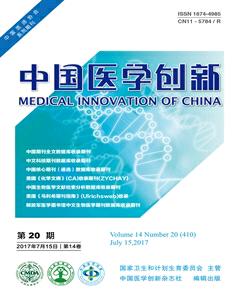Flavopiridol对胃肠道间质瘤细胞GIST882增殖、侵袭、凋亡及细胞周期的影响
牛丽霞+郑绘霞+梁建芳+肖虹
【摘要】 目的:研究Flavopiridol对胃肠道间质瘤细胞GIST882增殖、侵袭、凋亡及细胞周期的影响。方法:体外培养GIST882细胞至指数增长期,采用不同浓度的Flavopiridol对其进行干预,MTT法检测细胞增殖活性,Transwell小室实验检测细胞侵袭能力,流式细胞术检测凋亡及周期比例,western-blot检测CDK1,CDK2及caspase3蛋白的表达。结果:Flavopiridol呈浓度和时间依赖性抑制GIST882细胞增殖;Flavopiridol作用后GIST882细胞穿膜数量减少,侵袭能力降低,细胞凋亡率及G0/G1期比例增加,CDK1及CDK2蛋白的表达逐渐降低,caspase-3蛋白的表达逐渐增高。结论:Flavopiridol可抑制GIST882细胞增殖、降低侵袭力、阻滞细胞周期并诱导细胞凋亡,其抗肿瘤效应可能成为胃肠道间质瘤新的治疗途径。
【关键词】 胃肠道间质瘤; Flavopiridol; 增殖; 凋亡; 侵袭; 细胞周期
【Abstract】 Objective:To investigate the effect of Flavopiridol on the proliferation,invasion,apoptosis and cell cycle of gastrointestinal stromal tumors(GIST) cells GIST882.Method:GIST882 was cultured in vitro,flavopiridol was administered at different concentrations,MTT assay was used to detect cell proliferation,transwell chamber assay was used to detect cell invasion,flow cytometry was used to detect apoptosis and cell cycle,the expression of CDK1,CDK2 and caspase3 protein was detected by western-blot.Result:Flavopiridol inhibited the growth of GIST882 cells in a concentration-dependent and time-dependent way.Flavopiridol can reduce the ability of invasion,the apoptosis rate and G0/G1 phase ratio of GIST882 cells were increased after Flavopiridol treatment,the expression of CDK1 and CDK2 protein were decreased and caspase-3 protein was increased after Flavopiridol treatment.Conclusion:Flavopiridol can inhibit the proliferation of GIST882 cells,decrease the invasion capacities,block the cell cycle and induce apoptosis,the antitumor effect of Flavopiridol may be applicable on the treatment of gastrointestinal stromal tumors.
【Key words】 Gastrointestinal stromal tumor; Flavopiridol; Proliferation; Apoptosis; Invasion; Cell cycle
doi:10.3969/j.issn.1674-4985.2017.20.007
胃腸道间质瘤(Gastrointestinal stromal tumor,GIST)是一种特殊起源的间叶源性肿瘤,对常规放化疗不敏感,临床主要以外科治疗为主[1-2]。以甲磺酸伊马替尼(imatinib)为代表的靶向药物是一类酪氨酸激酶抑制剂,可作用于c-kit或PDGFRα,抑制肿瘤生长,改善患者预后[3-4]。然而,伊马替尼的耐药问题使其应用受限,部分患者不能从中获益[5]。Flavopiridol是一种黄酮类抗癌新药,主要通过抑制细胞周期依赖性蛋白激酶的活性发挥肿瘤抑制作用[6-7],据报道Flavopiridol可抑制c-kit mRNA表达,下调c-kit启动子活性,通过酪氨酸残基自身磷酸化作用抑制或减弱c-kit转录,可能成为治疗GIST的另一个选择[8-9]。本研究以GIST882细胞为研究对象,观察Flavopiridol对细胞增殖、侵袭、凋亡及相关蛋白表达的影响,为胃肠道间质瘤的研究提供新的思路,现报道如下。
1 材料与方法
1.1 实验材料 Flavopiridol,噻唑蓝MTT粉及碘化丙啶PI由美国Sigma提供;DMEM高糖培养基、胰酶、胎牛血清及hanks平衡盐溶液由美国Thermo提供;青链霉素双抗液及PBS液由武汉博士德提供;细胞凋亡检测试剂盒由美国beckman提供;CDK1,CDK2及caspase-3一抗由美国santa-cruz提供。
1.2 细胞培养及药物干预 人GIST882细胞由华中科技大学同济医学院王国平教授惠赠。常规复苏后采用含10%胎牛血清的DMEM高糖培养基培养,孵箱温度37 ℃,饱和湿度,每天更换培养基一次,待细胞生长至指数增长期时胰酶消化传代。实验分为五组,Flavopiridol浓度依次为0 nmol/L(对照组),10、100、500及1000 nmol/L组。endprint
1.3 MTT实验 将GIST882细胞胰酶消化悬浮,计数调整细胞密度为1×104,均匀接种于96孔板内,待细胞生长至指数增长期时更换含有不同浓度Flavopiridol的培养液,每组药物设立6个重复孔。分别于加药后12、24、36、48、72 h进行MTT检测:加入20 μL MTT(0.5%)继续培养4 h,弃去液体,加入150 μL DMSO,水平摇床轻摇5 min,上酶标仪检测490 nm波长下的吸光度值(A)。计算细胞生长抑制率:抑制率(%)=1-药物孔A/对照孔A×100%。
1.4 侵袭实验 将GIST882细胞悬浮后接种于transwell小室上层,细胞密度1×104,上层血清浓度为10%,含不同浓度的Flavopiridol。下层血清浓度为20%。置于孵箱培养24 h后去除上层的细胞,中性福尔马林固定,苏木素染色。观察细胞穿膜情况,显微镜下随机计数10个200倍视野细胞数量,取平均值。
1.5 细胞凋亡及周期检测 计数并调整GIST882细胞密度为1×104个/mL,接种到6孔板中,细胞至指数增长期时加入不同浓度的Flavopiridol,24 h时检测细胞凋亡比例:按照Annexin-V-FITC细胞凋亡检测试剂盒步骤进行,上流式细胞仪检测,数据采用仪器自带CELLquest软件进行分析;细胞周期采用PI标记法检测,冷却的PBS液及70%乙醇处理细胞,加入PI及RNaseA,上机检测,CELLquest软件进行分析。
1.6 western-blot實验 不同浓度Flavopiridol作用后72 h,胰酶消化后收集各组GIST882细胞,提取细胞总蛋白,标准曲线法检测蛋白浓度。10%聚丙烯酰胺SDS凝胶电泳,湿转法转膜至硝酸纤维素膜,蛋白干粉封闭,分别滴加一抗(CDK1∶CDK2浓度1∶600;caspase-3:β-actin浓度1∶800),4 ℃过夜孵育,滴加二抗(浓度1∶3000),化学发光成像显影,目的蛋白的相对表达量以其灰度值与内参的灰度值比值表示。
1.7 统计学处理 采用SPSS 18.0软件对所得数据进行统计分析,计量资料用(x±s)表示,多组资料比较采用one-way-ANOVA,两两比较采用t检验,检验水准α=0.05,P<0.05为差异有统计学意义。
2 结果
2.1 MTT实验结果 由吸光度值计算所得的细胞生长抑制曲线可以看出,Flavopiridol对GIST882细胞的增殖具有抑制作用,随着浓度的增加和时间的延长,抑制率逐渐增高。其中500 nmol/L自48 h开始抑制率大于50%,1000 nmol/L自24 h开始抑制率大于50%,即有效抑制浓度,见图1。
2.2 侵袭实验结果 经Flavopiridol作用24 h后,对照组,10、100、500及1000 nmol/L组细胞通过半透膜的平均数目依次为(28.4±5.2)、(26.1±6.9)、(19.6±5.8)、(13.5±7.7)、(9.6±4.2)个。其中,100、500及1000 nmol/L组与对照组比较,差异均有统计学意义(P<0.05),见图2。
2.3 细胞凋亡及周期检测结果 不同浓度的Flavopiridol作用24 h时,GIST882细胞凋亡比例增高,其中100、500及1000 nmol/L组与对照组相比差异均有统计学意义(P<0.05);细胞周期检测结果表明:G0/G1期细胞比例增高,S期细胞比例下降,其中500、1000 nmol/L组与对照组比较,差异均有统计学意义(P<0.05),见表1和图3。
2.4 western-blot实验结果 Western-blot结果显示,经Flavopiridol作用后,GIST882细胞CDK1及CDK2蛋白的表达逐渐降低,caspase-3蛋白的表达逐渐增高,见图4。与对照组相比,CDK1及caspase-3自500 nmol/L组起差异均有统计学意义(P<0.05),CDK2自100 nmol/L组起差异均有统计学意义(P<0.05),见图5。
3 讨论
GIST是一类具有独立起源的间叶源性肿瘤,即使很小的肿瘤也具有潜在恶性[10],临床及病理以危险度进行分级,所有GIST都具有复发和转移的风险[11]。目前,GIST的治疗以手术辅以靶向治疗为主,2002年,伊马替尼正式于美国上市,作为治疗GIST的一线方案用药,伊马替尼极大地改善了无法进行外科治疗、手术复发以及转移性GIST患者[12-13]。伊马替尼临床治疗中原发及继发耐药问题是其应用受限的主要原因,Antonescu等[14]的研究显示,约10%的患者存在原发耐药,且随着治疗的进行,约50%的患者对伊马替尼产生耐药性。目前,对于伊马替尼的耐药问题临床尚无较好的对策。
生理状态下的细胞增殖受细胞周期调控机制的严格控制,肿瘤发展过程中,细胞周期监控失调,导致细胞进入失控性生长状态[15-16]。Flavopiridol的作用靶点主要是细胞周期蛋白依赖激酶(Cyclin-dependent kinase,CDK),通过抑制CDKs活性,导致细胞周期发生阻滞,进而抑制肿瘤细胞的增殖[17]。目前,Flavopiridol已进入临床Ⅱ期实验阶段,对肝细胞癌、卵巢上皮性癌、白血病等多种肿瘤具有较为显著的疗效[18-20]。
本研究MTT结果显示,Flavopiridol可抑制GIST882细胞的增殖活性,细胞生长曲线提示该作用具有浓度和时间依赖性,500 nmol/L浓度48 h以及1000 nmol/L 24 h时,生长抑制了大于50%,达到有效抑制浓度。经Flavopiridol作用后,GIST882细胞穿过transwell半透膜的数目减少,说明肿瘤细胞的侵袭能力降低。诱导细胞凋亡是抗肿瘤药物发挥作用的重要机制,caspase-3蛋白是细胞凋亡的重要执行因子,是caspase介导的凋亡途径中的关键效应水解酶,活化的caspase-3可使参与细胞增殖、周期调控、DNA损伤修复等蛋白激酶失活,诱发细胞凋亡。本研究结果显示Flavopiridol作用后GIST882细胞凋亡比例增高,caspase-3的表达上调,提示Flavopiridol可能通过凋亡途径发挥增殖抑制作用。细胞周期分析显示:Flavopiridol可使GIST882细胞阻滞于G0/G1期,导致S期细胞含量相对下降,并伴随着CDK1及CDK2蛋白的表达下调。endprint
綜上所述,本研究结果证实Flavopiridol在体外对GIST882细胞具有一定的抗肿瘤效应,为GIST的研究提供了新的思路和实验依据。相信随着临床实验的进一步开展,以Flavopiridol为代表的CDKs抑制剂将会给GIST患者带来新的曙光。
参考文献
[1] Miettinen M,Sobin L H,Lasota J.Gastrointestinal stromal tumors of the stomach:a clinicopathologic,immunohistochemical,and molecular genetic study of 1765 cases with long-term follow-up[J].Am J Surg Pathol,2005,29(1):52-68.
[2] Miettinen M,Lasota J.Gastrointestinal stromal tumors[J].Gastroenterol Clin North Am,2013,42(2):399-415.
[3] Eisenberg B L,Trent J C.Adjuvant and neoadjuvant imatinib therapy:current role in the management of gastrointestinal stromal tumors[J].In J Cancer,2011,129(11):2533-2542.
[4] Verweij J,Casali P G,Zalcberg J,et al.Progression-free survival in gastrointestinal stromal tumours with high-dose imatinib:randomised trial[J].Lancet,2004,364(9440):1127-1134
[5] Demetri C D,von M M,Blanke C D,et al.Efficacy and satety of imatinib mesylate in advanced gastrointestinal stromal tumors[J].
N Engl J Med,2002,347(7):472-480.
[6] Maddocks K,Wei L,Rozewski D,et al.Reduced occurrence of tumor flare with flavopiridol followed by combined flavopiridol and lenalidomide in patients with relapsed chronic lymphocytic(CLL)[J].Am J Hematol,2015,90(4):327-333.
[7] Aktug H,Acikgoz E,Uysal A,et al.Comparison of cell cycle components,apoptosis and cytoskeleton-related molecules and therapeutic effects of flavopiridol and geldanamycin on the mouse fibroblast,lung cancer and embryonic stem cells[J].Tumour Biol,2016,37(9):12 423-12 440.
[8] Sambol E B,Am brosini G,Geha R C,et al.Flavopirido targets c-KIT transcription and induces apoptosis in gastrointestinaI stromal tumor cells[J].Cancer Res,2006,66(11):5858-5866.
[9] Kruse U,Pallasch C P,Bantscheff M,et al.Chemoproteomics-based kinome profiling and target deconvolution of clinical multi-kinase inhibitors in primary chronic lymphocytic leukemia cells[J].Leukemia,2011,25(1):89-100.
[10] Demetri G D,Von M M,Blanke C,et al.Efficacy and safety of imatinib mesylate in advanced gastrointestinal stromal tumors[J].
N Eng J Med,2002,247(7):472-480.
[11] Fletcher C D,Berman J J,Corless C,et al.Diagnosis of gastrointestinal stromal tumors:A consensus approach[J].Hum Pathol,2002,33(5):459-465.
[12] Joensuu H,Eriksson M,Hallk S,et al.One vs three years of adjuvant imatinib for operable gastrointestinal stromal tumor:a randomized trial[J].Jama,2012,307(12):1265-1272.endprint
[13] Gao J,Tian Y,Li J,et al.Secondarymutations of c-KIT contribute to acquired resistance to imatinib and decrease efficacy of sunitinib in Chinese patients with gastrointestinal stromal tumors[J].Medi Oncol,2013,30(2):1-7.
[14] Antonescu C R,Besmer P,Guo T,et al.Acquired resistance to imatinib in gastrointestinal stromal tumor occurs through secondary gene mutation[J].Clin Cancer Res,2005,11(11):4182-4190.
[15] Otto T,Sicinski P.Cell cycle proteins as promising targets in cancer therapy[J].Nat Rev Cancer,2017,17(2):93-115.
[16] Di G C,Novellino E,Chilin A,Investigational drugs targeting cyclin-dependent kinases for the treatment of cancer:an update on recent findings(2013-2016)[J].Expert Opin Investig Drugs,2016,25(10):1215-1230.
[17] Roskoski R.Cyclin-dependent protein kinase inhibitors including palbociclib as anticancer drugs[J].Pharmacol Res,2016,107:249-275.
[18] Ang C,OReilly E M,Carvajal R D,et al.A nonrandomized,phase Ⅱ study of sequential irinotecan and flavopiridol in patients with advanced hepatocellular carcinoma[J].Gastrointest Cancer Res,2012,5(6):185-189.
[19]宋悅,沈铿,徐峰.靶向调控的活性半胱氨酸天冬氨酸蛋白酶3联合细胞周期蛋白依赖性激酶抑制剂flavopiridol对卵巢上皮性癌的治疗作用[J].中华妇产科杂志,2010,45(10):781-786.
[20] Zeidner J F,Karp J E.Clinical activity of alvocidib(flavopiridol) in acute myeloid leukemia[J].Leuk Res,2015,39(12):1312-1318.endprint

